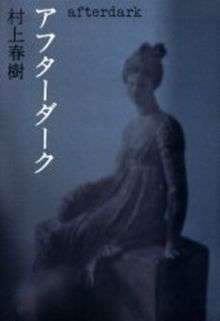After Dark (Murakami novel)
After Dark (アフターダーク, Afutā Dāku) is a 2004 novel by Japanese author Haruki Murakami.[1]
 First edition (Japanese) | |
| Author | Haruki Murakami |
|---|---|
| Original title | アフターダーク Afutā Dāku |
| Translator | Jay Rubin |
| Country | Japan |
| Language | Japanese |
| Publisher | Kodansha (Japan) Harvill Press (UK) Alfred A. Knopf (US) |
Publication date | 2004 |
Published in English | May 2007 |
| Media type | Print (Hardcover) |
| Pages | 208 |
| ISBN | 0-307-26583-8 (US) 1-84655-047-5 (UK) |
| OCLC | 81861840 |
Plot summary
Set in metropolitan Tokyo over the course of one night, characters include Mari Asai, a 19-year-old student, who is spending the night reading in a Denny's. There she meets Takahashi Tetsuya, a trombone-playing student who loves Curtis Fuller's "Five Spot After Dark" song on Blues-ette; Takahashi knows Mari's sister Eri, who he was once interested in, and insists that the group of them have hung out before. Meanwhile, Eri is in a deep sleep next to a television and seems to be haunted by a menacing figure.
Mari crosses paths with a retired female wrestler, Kaoru, now working as a manager in a love hotel called "Alphaville". Kaoru needs Mari to talk to a Chinese prostitute who had just been beaten in the love hotel by an office worker, Shirakawa. The group then tries to track down Shirakawa, and includes the Chinese Mafia group that 'owns' the prostitute.
In the love hotel Mari also hears a story of some staff working there and takes a glance at the other world hidden below the one we are aware of.
Parts of the story take place in a world between reality and dream, and each chapter begins with an image of a clock depicting the passage of time throughout the night.
Characters
- Mari Asai, a 19-year-old student learning Chinese philology. As a child she went to a school for Chinese children. Mari is rather reserved when talking to strangers but however is keen on "making everything right".
- Tetsuya Takahashi, a trombone-playing student who, however, wants to stop practising music and start learning law. He is rather optimistic and doesn't want to live a big life.
- Kaoru, a retired female wrestler now working as a manager in the love hotel, "Alphaville". She is trustworthy, honest and always seeking justice.
- Shirakawa, an office worker who beat a Chinese prostitute in "Alphaville".
Structure
The story is broken down in small chapters of varying length and has a real-time timeline. Some chapters are describing the situation happening with Eri Asai, and some describe the night of Mari Asai. However, as always, Haruki Murakami links the two stories in the end.
The novel is filled with symbols that can be understood in many different ways. Such strong symbols as music, night, light, cameras and not working television are used, and the author leaves it to his readers to interpret them in one way or another.
Reception
The novel received a 64% rating from the book review aggregator iDreamBooks based on 17 critics' reviews. A common point of criticism was the ending, or apparent lack thereof, which many critics found retroactively soured the rest of the book.[2]
References
External links
- Comprehensive After Dark resource page
- The Guardian review
- Strange Horizons review
- After Dark at the Internet Book List